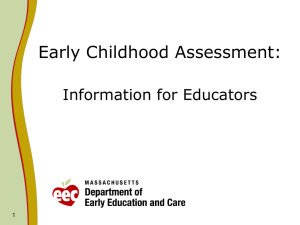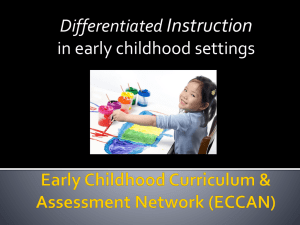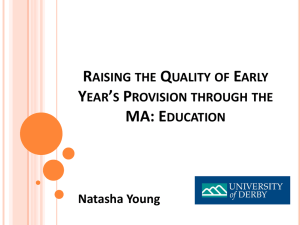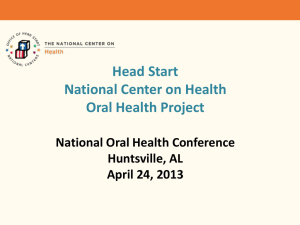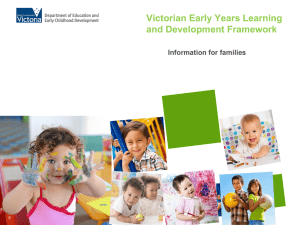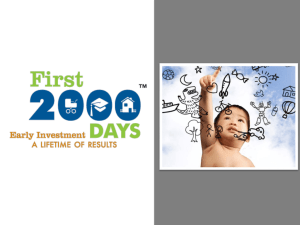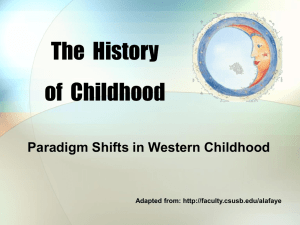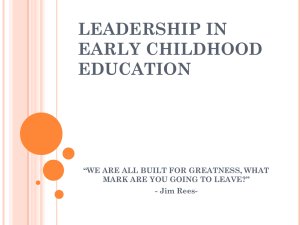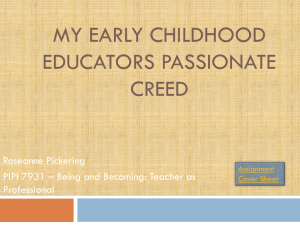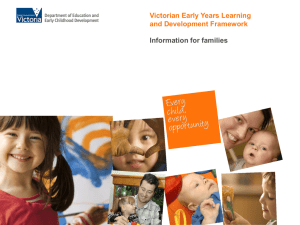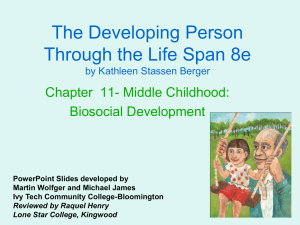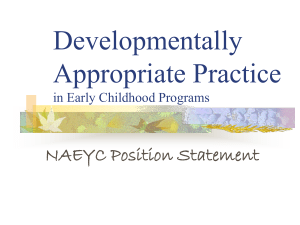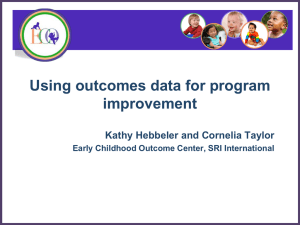Early Childhood Assessment
advertisement
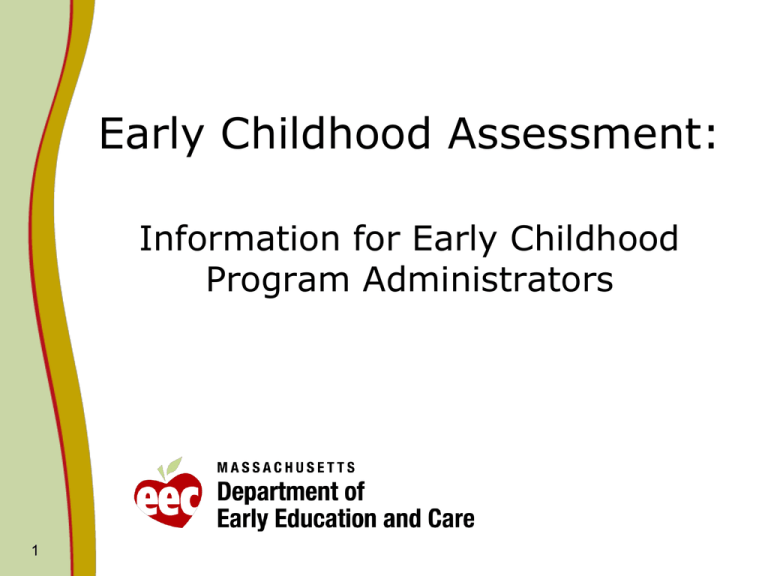
Early Childhood Assessment: Information for Early Childhood Program Administrators 1 Overview 2 What and why it is important Early Childhood vs. K-12 assessment Types of child assessment systems Support to staff Use of data Equipment, materials, resources Parent Involvement Role of Massachusetts Department of Early Education and Care What is Early Childhood Assessment? 3 Process of observing, recording, and documenting work of children Allows educators to make the best decisions for the child Methods can include standardized tests observations, child portfolios, teacher and parent checklists and child and parent interviews Child screening vs. assessment Why is Early Childhood Assessment Important? Growing emphasis on early childhood assessment Better decisions regarding teaching and learning Identifying children with special needs Program Improvement 4 What about a child is assessed? 5 Emotional/Social: expressing feelings, forming friendships, resolving conflicts with others Language: listening and talking Physical: using pencils (fine motor skills), climbing and running (gross motor skills) Cognitive: numbers, colors, and patterns Approaches to Learning: curiosity and excitement about learning and ways of learning new information How does early childhood assessment differ from K-12th grade assessment? 6 Kindergarten – 12th grade assessment places emphasis on academic knowledge Early childhood assessment places emphasis on all aspects of a child’s development How does early childhood assessment differ from K-12th grade assessment continued… 7 K-12th grade assessment uses mainly tests, quizzes and essays. Early childhood assessment uses child observations, developmental checklists and child portfolios Both are used to guide decisions about… * Child interventions * Resources Types of Child Assessment Systems Program-developed child assessment tools *Pros *Cons 8 Types of Child Assessment Systems cont… Published (or packaged) child assessment tools *Pros *Cons 9 Choosing an Appropriate Assessment System 10 A well-designed assessment system: * Considers all domains of child development * Is developmentally appropriate * Aligned with your curriculum and the state’s early learning standards * Reliable, valid, and fair * Captures growth over a period of time Training Opportunities on Early Childhood Assessment 11 Opportunities for staff to better understand early childhood assessment * College courses * Training by publishers * Offerings through local Child Care Resource and Referral Agency * EEC Professional Development calendar: www.eec.state.ma.us/ProfessionalDev elopment/WebFindTraining.aspx Ways to Support Your Staff in the Assessment Process 12 Confidential observations Assistance in writing summary statements ELL staff and observations Computer access Staff meeting agenda item Time for training and implementation Staff planning time Using Child Assessment Data 13 Evaluate effectiveness Staff support Better inform parents Assist in child transitions Identify children who need special services Program improvement Suggested Equipment, Materials, and Resources 14 Equipment: computer, printer, digital camera, high-speed internet Materials: notebooks for portfolios, photo paper, paper, clip boards, post-it notes Resources: assessment tool-kits, books/articles on early childhood assessment How can Parents be Involved in the Early Childhood Assessment Process? 15 Enrollment On-site developmental screenings Parent Checklists Parent/Teacher conferences What is Massachusetts currently doing around early childhood assessment? Universal Pre-Kindergarten Pilot Project * 16 Assessment Planning Grants More information: www.eec.state.ma.us UPK Eligible Child Assessment Tools 17 Creative Curriculum’s Developmental Continuum or CreativeCurriculum.net Work Sampling System High Scope Child Observation Record Ages and Stages Questionnaire In closing… 18 Suggested articles specific to early childhood assessment Contact at the Dept. of Early Education and Care: Jennifer Louis Dept. of Early Education and Care 51 Sleeper St., 4th Floor Boston, MA 02210 (617)988-6640 Jennifer.Louis@state.ma.us
